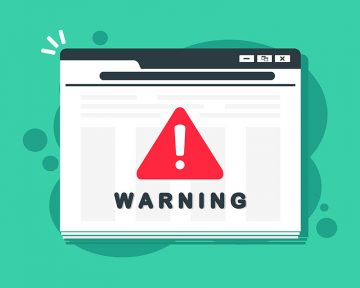Heavypcprotection.com Uses Fake Virus Scares to Push Ads

During our investigation into web pages associated with unreliable advertising networks, we came across the website heavypcprotection.com. Our findings unveiled that heavypcprotection.com is an untrustworthy site notorious for promoting a well-known fake virus warning scam. Additionally, heavypcprotection.com requests users to grant permission for displaying notifications.
Upon accessing heavypcprotection.com, the website initiates a simulated system scan and presents a deceptive message claiming that your computer is infected with five viruses. This false notification aims to create a sense of urgency, misleading users into believing that these alleged viruses pose a threat to their system's security, as well as the safety of their sensitive information, personal data, and banking details.
While visiting heavypcprotection.com, users are encouraged to perform a scan to remove the supposed threats identified by the website. However, it's important to note that heavypcprotection.com is not owned or developed by the company producing the legitimate antivirus application that the misleading site spoofs and impersonates.
In addition to utilizing scare tactics to promote legitimate antivirus software, heavypcprotection.com also seeks permission to display notifications. The notifications generated by heavypcprotection.com are intentionally designed to deceive users into believing that their computers have been targeted by ransomware attacks or other malicious threats.
Why Should You Never Trust Virus Warnings You See on Websites?
There are several reasons why you should never trust virus warnings that you encounter on websites. Here are some key points to consider:
- Social Engineering Tactics: Many websites use virus warnings as a form of social engineering to deceive users and manipulate their behavior. These warnings often employ alarming language, urgent messages, and scare tactics to create a sense of panic and urgency. Their primary goal is to trick users into taking immediate action without proper verification or analysis.
- Fake Alerts and Scams: Some websites intentionally display fake virus warnings as part of scams or fraudulent activities. These warnings may claim that your device is infected with a high number of viruses or other malware, creating a sense of fear and urgency. They often prompt users to download or purchase specific software, leading to financial loss or the installation of actual malware.
- Unauthorized Pop-ups: Pop-up windows displaying virus warnings on websites are often unauthorized and illegitimate. They can be triggered by malicious code injected into the website or triggered by deceptive advertisements. Legitimate security alerts typically come from trusted antivirus software installed on your device, not from random websites.
- Manipulation and Exploitation: Virus warnings on websites can be used as a means to exploit vulnerabilities in your device or web browser. Clicking on these warnings or following their instructions may lead to the execution of malicious scripts, the installation of malware, or the theft of personal information.
- Lack of Credibility and Verification: Websites displaying virus warnings generally lack credibility and should not be trusted as reliable sources of security information. Legitimate security alerts are typically issued by reputable antivirus companies, operating systems, or trusted security organizations. Relying on random website warnings can result in unnecessary actions or even compromise the security of your device.
To ensure your online safety and protect against potential threats, it is recommended to rely on trusted antivirus software, keep your operating system and applications up to date, exercise caution when browsing the internet, and be skeptical of virus warnings encountered on unfamiliar or unverified websites.







